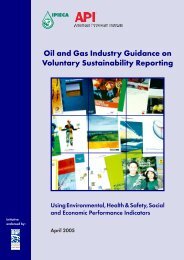Technology Cooperation and Capacity Building - CommDev
Technology Cooperation and Capacity Building - CommDev
Technology Cooperation and Capacity Building - CommDev
Create successful ePaper yourself
Turn your PDF publications into a flip-book with our unique Google optimized e-Paper software.
TECHNOLOGY COOPERATION AND CAPACITY BUILDING… Case Study NinePT Caltex Pacific Indonesia‘… A developing nation needs all the social <strong>and</strong> economiccompetencies that are so plentiful in the developed world. Andalthough these are the very competencies that the governmentsof developing societies are ill-equipped to disseminate—evenwith international aid—they are precisely the competencies thattransnationals possess in abundance <strong>and</strong> provide, teach, <strong>and</strong>encourage … Today [transnationals] need far more than adeveloping nation’s mineral resources. They need skilled labour,consumer markets, financial <strong>and</strong> commercial partners, <strong>and</strong>continuing business opportunities into the near <strong>and</strong> distantfuture. In other words, they need development. And their needis urgent, whether they acknowledge it or not.’Julius Tahija, Chairman EmeritusPT Caltex Pacific Indonesia‘Swapping Business Skills for Oil’Harvard Business Review, Sept.-Oct. 1993Environmental protectionEnvironmental conservation is an important priority of theGovernment of Indonesia, CPI <strong>and</strong> AI. One proof of CPI’spublished commitment ‘to be recognized as a leader inenvironment, health <strong>and</strong> safety among all Indonesianproduction-sharing contractors’ is the company’s trainingprogramme in these areas. Ninety-five Indonesian oil <strong>and</strong> gasprofessionals from Pertamina, government agencies, <strong>and</strong> CPIare trained at Chevron <strong>and</strong> Texaco facilities in the UnitedStates. Developed at the request of Pertamina, thecomprehensive <strong>and</strong> intensive four-month course includesh<strong>and</strong>s-on <strong>and</strong> classroom study. Participants learn the latesttechnology <strong>and</strong> practices in operational safety, risk <strong>and</strong> healthmanagement, water <strong>and</strong> air quality, ground water protection,hazard identification <strong>and</strong> emergency preparedness.CPI is helping to safeguard the Indonesian rain forest byusing directional drilling techniques to minimize forestclearing, reinjecting produced water, <strong>and</strong> reforesting <strong>and</strong>replanting to control erosion. In Sumatra, it has intensified aprogramme to remediate operating areas. Drill sites arebeing returned to their original state by planting indigenousspecies, <strong>and</strong> environmentally-compatible vegetation is beingplanted along access roads. CPI’s Ecology Clubs at its campsin Rumbai, Minas <strong>and</strong> Duri have established forest natureparks that preserve environmentally-sensitive areas of forestnear company camps for employees, their families <strong>and</strong>citizens of Riau Province. CPI’s environmental protectionpolicy calls for full compliance with local <strong>and</strong> nationalst<strong>and</strong>ards, <strong>and</strong> to self-regulate where st<strong>and</strong>ards do not exist.For example, CPI is committed to re-injecting 85 per cent ofproduced water by 1998. It has also taken other steps toprotect the Indonesian rain forest, including developing newdesigns for its gathering stations, applying directional <strong>and</strong>THE BACKGROUNDThe economic <strong>and</strong> social development ofhost countries is often intertwined withthe business fortunes of transnationalcorporations <strong>and</strong> their local affiliates. Thisis evident not only in technical <strong>and</strong>business areas but also in community <strong>and</strong>human resource development <strong>and</strong>environmental protection. At the heart ofthis partnership is technology cooperation,characterized as much by the building ofself-sustaining economic <strong>and</strong> socialcompetence as by the flow of technology,skills <strong>and</strong> financial resources.PT Caltex Pacific Indonesia (CPI),Indonesia’s largest producer of oil, worksclosely with Pertamina, Indonesia’snational oil company, <strong>and</strong> CPI’sshareholders Chevron <strong>and</strong> Texaco. Thecompany focuses on projects that meetIndonesia’s energy priorities <strong>and</strong> thatadd value for both the government <strong>and</strong>CPI’s shareholders. As the largestproduction sharing contractor forPertamina, CPI produces 720 000barrels of oil a day, approximately halfthe nation’s production.The company makes a significantcontribution to Indonesia’s economic <strong>and</strong>social development, meeting obligations tolocal communities, its 6400 employees <strong>and</strong>18 000 contractor employees, the nation,<strong>and</strong> all parties with a stake in it.The combination of business <strong>and</strong> socialobjectives is a feature of the public/privatepartnership in Indonesia. Its success stemsfrom the Government of Indonesia’scommitment to providing the economic<strong>and</strong> political framework conducive toprofitable operations. The frameworkincludes a stable political <strong>and</strong> economicsystem, a transparent <strong>and</strong> equitable legal<strong>and</strong> financial structure, soundenvironmental laws <strong>and</strong> regulations, <strong>and</strong>guaranteed movement of necessarypersonnel <strong>and</strong> materials.47


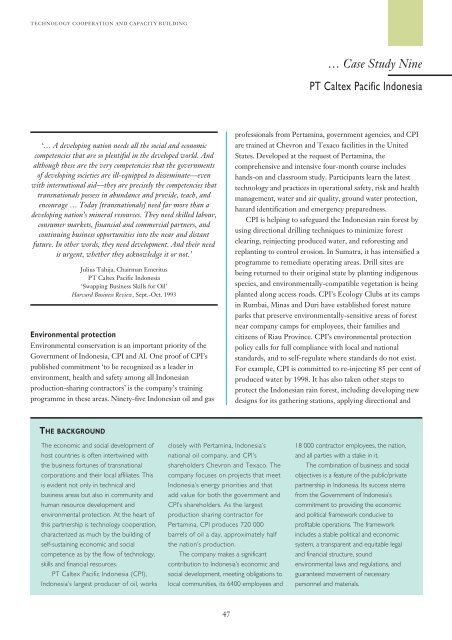
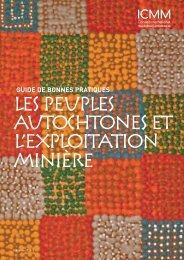
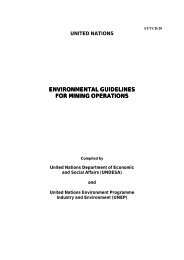
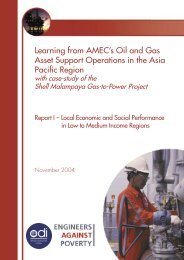
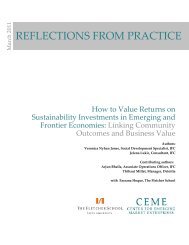
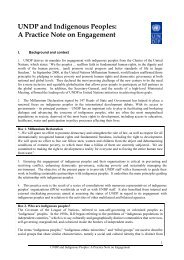
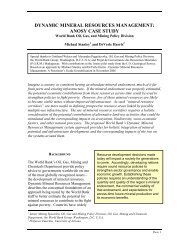
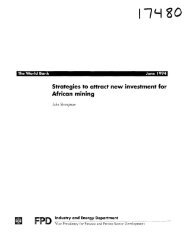

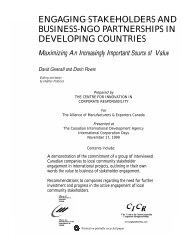
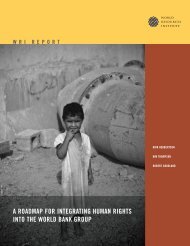
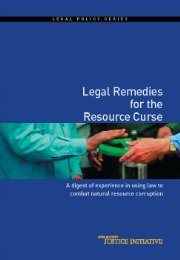
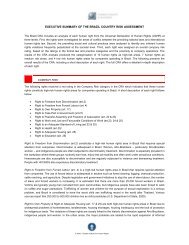
![[PDF] Community Development Toolkit - CommDev](https://img.yumpu.com/48616495/1/184x260/pdf-community-development-toolkit-commdev.jpg?quality=85)
